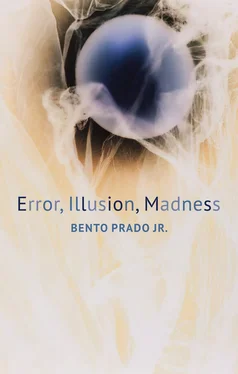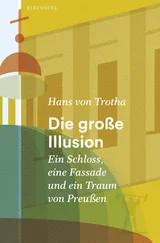Note the decisive dichotomy. There is a language that does not recognize its communicational submission to the condition of being a system of signs. There is a language that, even if it does not communicate, is “the universal soil of all existence and destiny,” as if this were a matter of expressing the latency of a common that lacks a grammar of its own but is a common soil from which language itself and any oeuvre arise. Let us try to render explicit here a major tension at play. Let us remember something that Bento Prado wrote in his unpublished diaries: “poetry may not be fully translated, but Croce’s texts on untranslatability were translated and understood in at least twenty-four different languages.” No, poetry can never be entirely translated because, in its own way, it touches on a common that has no proper grammar and that, for this reason, does not travel from one language to another; it is not codifiable through the operations of translatability. But this impotence of language is not a weakness or a limitation. Rather it is its strength: the strength of a language that comes too close to that which can put it at risk, only so as to expose the possibility of a constant overcoming of limits. This explains perhaps why, according to Bento Prado, the one true error that a philosophy can produce is
The error of postulating (a devout vow) too much clarity or regularity in, let us say, souls and things, too much limpidness in language. The metaphor of a nature whose profile is ragged or badly drawn is set against the categories of the instant, of place and event, such as they were defined by classical thought. 14
For what is at stake is understanding the event no longer as an element in the sense of a simple part or an indivisible atom, but as an element in the sense of an atmosphere or horizon: that is, in the sense of a field, a plane of implication that emerges beyond the therapeutic demands of a “readaptation to the world through the rediscovery, re-encounter or reconciliation with oneself, in the actuality of everyday life and its forms of expression.” 15This plane of implication will never become actualized as a logos capable of ensuring the ground of our processes of deliberation as a search for the best argument. Often, in fact, Bento Prado would describe it as the anchoring of language in phusis , as when he wrote about Guimarães Rosa’s capacity to “reveal a writing first sketched at the point zero of humanity and culture, in nature itself.” 16We will examine each of these points in time.
Before we do, however, let us remember that this nature with a ragged profile, traversed by zones of indeterminacy and inapprehension, is a way of philosophically integrating what could be understood as an originary phantasm that will haunt Brazilian national experience, namely the fantasy of a lack of fiber, of a decomposed and discontinuous reality—seen as the damning mark of a lack of foundation supposedly to be overcome. In Mário de Andrade’s words, Brazil would be a “muck of contrasts” without any logic. 17This is the narrative of a formless country, which believes at each moment that it must be refounded, severed from its dead zone of indeterminacy so that it may finally find its hour amid the developed world and its law, its supposedly clear distribution of places and firmly established individuations 18—or else so that it may find its “formation,” this time in a register that is already critical of this notion of progress. It was against this originary phantasm that Bento Prado’s philosophy constituted itself.
Let us now turn to a central point in Error, Illusion, Madness in order to better understand the political consequences of a philosophical experience of this kind.
Habermas used to say:
No matter how consistent a dropout he may be, [the radical skeptic] cannot drop out of the communicative practice of everyday life, to the presuppositions of which he remains bound. And these in turn are at least partly identical with the presuppositions of argumentation as such. 19
Even if we do not necessarily subscribe to a transcendental pragmatic standpoint, we could at least have a general grammar capable of regulating conflicts through the search for the best argument.
However, one of Bento Prado’s major critical strategies consisted in inquiring into the structure of subjectivity presupposed by philosophical positions that wished to salvage some form of normativity immediately accessible to the subject. Such deconstructions of normativity, which went as far as claiming that the common person is no more than a “pedagogical project,” were in fact initial moves in a redimensioning of experience, since the abandonment of a normative horizon led to the acknowledgment of the “unavoidable ambiguity of experience and the discursive anarchy that it opens.” 20
But how are we to understand this “discursive anarchy”? Such a defense of the ambiguity of experience, of the search for an irreducible heterogeneity, a defense that supposes a discursive anarchy that resists conceptual unification, could seem at first to be merely a profession of irrationalistic—or at the very least relativistic—faith. The case supporting that accusation appears to grow when we take into account the way in which Bento Prado used to assert the impossibility of providing a positive foundation for the universalizing criteria of judgment. Seeking support in a reading of Wittgenstein’s notion of language games, Bento Prado insisted that the universalization of criteria and systems of rules was not exactly the object of a more or less transparent communicational understanding. Rather it was an object of persuasion, and whoever says “persuasion” says more than just recognition of a better argument—and, against the wishes of some “conversational” conceptions of philosophy, recognizes no neutral arena in which the claims to truth of metaphysical interpretations could be tested.
On the contrary, whoever says “persuasion” necessarily says conversion, constitution of a conflictual field in which processes of identification and circuits of affects, libidinal investment, constitution of authority criteria, and so on all come into play. The field of persuasion is a battlefield, Bento Prado would often insist, not a placid arena of communicational understanding. That led him to statements such as: “The basis of a language game is not constituted by propositions susceptible to truth or falsity but corresponds only to something like a choice without any rational foundation.” 21It corresponds to a “pathological” decision, in the sense not that it is distorted, but that it is affected by a pathos that refers us back to the sensible. In a country haunted by the state’s use of “pacts” and “conciliations” allegedly animated by communicative rationality (since that was the official state ideology under the “Brazilian enlightenment” of Fernando Henrique Cardoso’s administration), 22talk of “discursive anarchy” could not fail to have rather obvious critical resonances for the readers.
At any rate, we can see that this would be a risky philosophical operation for several reasons. First, to define rational argumentation as a conflictual field of persuasion implies, at least in this case, dismantling any strict dichotomies between the psychological and the transcendental, since it entails bringing seemingly psychological categories to bear on processes of rational argumentation. Ultimately, given that the transcendental guarantee itself is put at risk, it looks as though we will just end up dissociating matters of justification from matters of fact. After all, if the basis of a language game is made up of choices with no rational foundation, nothing can justify it except the objective existence of social practices that I take to be necessary.
Читать дальше












